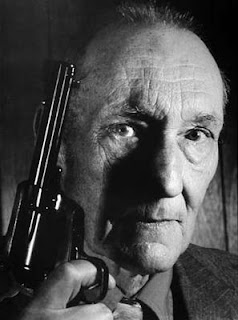 One thing I've noticed in learning about the Beat Generation is that the writers encourage or enthuse their own philosophy. Despite this, some philosophies seem easier to live by than others, and some writers may not practice what they preach. If one were to live precisely by Burroughs's ideology, it is not likely that they would get far in life professionally or socially. In any case, living with a strict philosophy may be impossible in that some things may contradict others. However, I do not believe that any of these poets were being literal enough to cause controversy within their theoretical system. I believe they were merely pressing these lifestyles onto society through their writing with the hopes of seeing some sort of positive change in society.
One thing I've noticed in learning about the Beat Generation is that the writers encourage or enthuse their own philosophy. Despite this, some philosophies seem easier to live by than others, and some writers may not practice what they preach. If one were to live precisely by Burroughs's ideology, it is not likely that they would get far in life professionally or socially. In any case, living with a strict philosophy may be impossible in that some things may contradict others. However, I do not believe that any of these poets were being literal enough to cause controversy within their theoretical system. I believe they were merely pressing these lifestyles onto society through their writing with the hopes of seeing some sort of positive change in society. The writer from the Beat Generation who I believe has a stronger philosophy, and one that he lived by for much of his life, is Gary Snyder. This week, our class discussed Snyder's work. Buddhist influences are evident in both his poems and his essays. His writings consistently involve themes of nature, and more specifically, the idea of people and nature joining without institutionalization or influence of systematic power.
Not only did Snyder write about these ideas, and perhaps delve lightly into the culture that he preached (as other Beat writers have), but he lived for some time in Japan, where he studied Zen. He later traveled to India in a similar cultural pursuit. These travels were not for the mere sake of an impermanent good time, as they would outline his values for the rest of his life. The video gives a short perspective of some parts of Snyder's life as well as the philosophy in which he lives by.
Many have deemed Snyder the "Thoreau of his generation," as Beat writer, Lawrence Ferlinghetti once said. I can appreciate Snyder's beliefs because they are not harmful or selfish, as many of the writers from the Beat Generation have demonstrated. While the Beat Generation as a whole represents those writers' responses to the state of their nation and its society, those responses taken individually were all considerably different. Snyder's response was hopeful, unlike some writing of Ginsberg, Burroughs, or even Kerouac (such as in "The Vanishing American Hobo").
Snyder returned to the states and still lives life according to his Zen Buddhist beliefs. I cannot imagine living a lifestyle such as Burroughs' or Ginsberg's past my youth, but I can imagine that Snyder's values can logically be maintained throughout a person's life without being greatly compromised. I do not say this to give the impression that I plan to pursue such a philosophy for myself. I only mean to argue that it is reasonable in comparison to those of the other Beat writers thus far. I will leave with these words from Snyder, which not only support his philosophy, but can also be considered for general encouragement:
"We are all indigenous. We may not transform reality, but we may transform ourselves. And if we transform ourselves, we might just change the world a bit."




